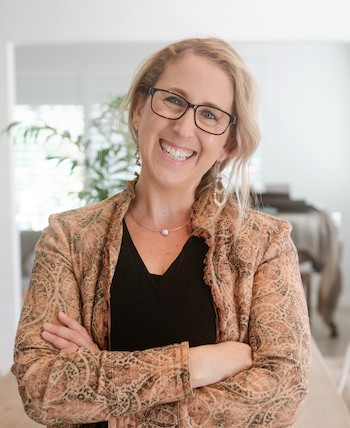
Mental health expert Kim Huckerby, who spoke at the Bendigo GRDC Research Update. Photo: Courtesy Kim Huckerby
When your workplace and your home are one and the same, it can feel impossible to set and maintain boundaries, but mental health expert Kim Huckerby says they are essential for preserving our wellbeing.
Delivering a keynote address at the Bendigo GRDC Research Update, Ms Huckerby said recent years had delivered more than their fair share of big challenges in agriculture: rising costs, extreme weather, COVID-19, isolation and mental illness.
“I am not even going to try to imagine what the last few years have been like for all of you,” she said.
“We have so many things that keep on getting thrown at us every single day. I want us to remember those things, but also the other things that are often forgotten, that are really, really important – ourselves included.”
Ms Huckerby, who founded the Wellbeing Affect in 2018 after more than 20 years as a social worker and counsellor, said healthy relationships with family, children and community were crucial for wellbeing.
Mental health ‘trajectories’
She urged people to stop conflating mental health and mental illness, explaining that mental health exists on a continuum, with positive mental health at one end and severe mental illness at the other.
“When we look at it like that, it becomes clear that we are all on a different mental health trajectory,” she said.
“When we look at it like that, it allows us to understand... where we fit, where we might be feeling anxiety, or there’s deep pressures, burnout, and we want to try and get to those as early as possible.”
She also challenged the audience to drop the “He’ll be right. She’ll be right” attitude and stop saying things like “Come on mate, drink some concrete and harden up”, even in jest.
Three things she suggested looking out for in yourself and others are:
- major changes in a person’s thoughts, feelings and behaviours, such as social withdrawal;
- changes affecting that person’s everyday life, whether it be work, school or family; and
- those changes lasting for longer than expected.
“Often people can see this in someone else. But I want us to reframe that to look through a lens where we can actually see this within ourselves and start taking care of ourselves.”
Ms Huckerby used the oxygen mask analogy from the safety briefing that occurs on flights before take-off, when staff remind passengers to put on their own oxygen mask first, before helping children and others in an emergency.
Work/life boundaries
The same goes for putting work/life boundaries in place between work and life, and establishing habits that contribute to mental, physical, spiritual and emotional wellbeing.
Just as we learned to brush our teeth as children and put on a seatbelt when we get into a car, Ms Huckerby said we could develop new habits that help us look after ourselves.
“Self-care doesn’t have to be grand gestures. It can also be tiny things: calling a mate you haven’t spoken to in a long time, watching funny dog videos on YouTube as a group and having a great belly laugh. Or it might be sitting in silence, walking outside, taking three deep breaths.
“Healthy mindset is when we take care of ourselves consistently; this isn’t a one-time thing.”
She also advocated habit stacking: attaching a new habit to an existing one, such as doing a written brain dump to get thoughts out of your head while you’re having your regular morning or afternoon cuppa.
She said healthy boundaries in your relationships can be introduced, but it was also important to notify others – clients, workmates, friends – when you put them in place.
She recalled the words of her 94-year-old grandmother, who often said “Kim, you teach people how you want to be treated”, and referred to South Australian agribusiness consultant Ken Solly, who coined the term “packaging a yes” for those times when the boundary between friendship and business becomes blurred.
“If you’re out one night with some friends, and they happen to be your clients, and they start talking about work: we can say something like, ‘That sounds great. Let’s catch up tomorrow morning at nine o’clock after I’ve dropped the kids at school and let’s have a chat about it then, during work time’. Done.”
When it comes to supporting others, she recommended building trust through confidentiality, and being non-judgmental when someone opens up to us.
It was also important to give them space to process their thoughts without interrupting or trying to solve their problems for them, demonstrating empathy – understanding what it’s like from their perspective – and being authentic in your interactions.
More information: Kim Huckerby, hello@thewellbeingaffect.com.au
How to talk about wellbeing
Not sure what to say? Try these conversation starters or responses:
“Hey, mate, I’ve missed you around town lately. Is everything okay? I want to support you if there’s something you’re having a hard time with.”
“Hey, I’m not sure what’s going on, but I want you to know you’re not alone.”
“Thanks for sharing. I’m sure it took a lot of courage.”
“Have you thought about seeing the GP? I’m sure they can chat to you about that kind of stuff.”
Resources
ifarmwell is a free online tool kit to help farmers cope effectively with life’s challenges and get the most out of every day, regardless of the circumstances they face.

























































